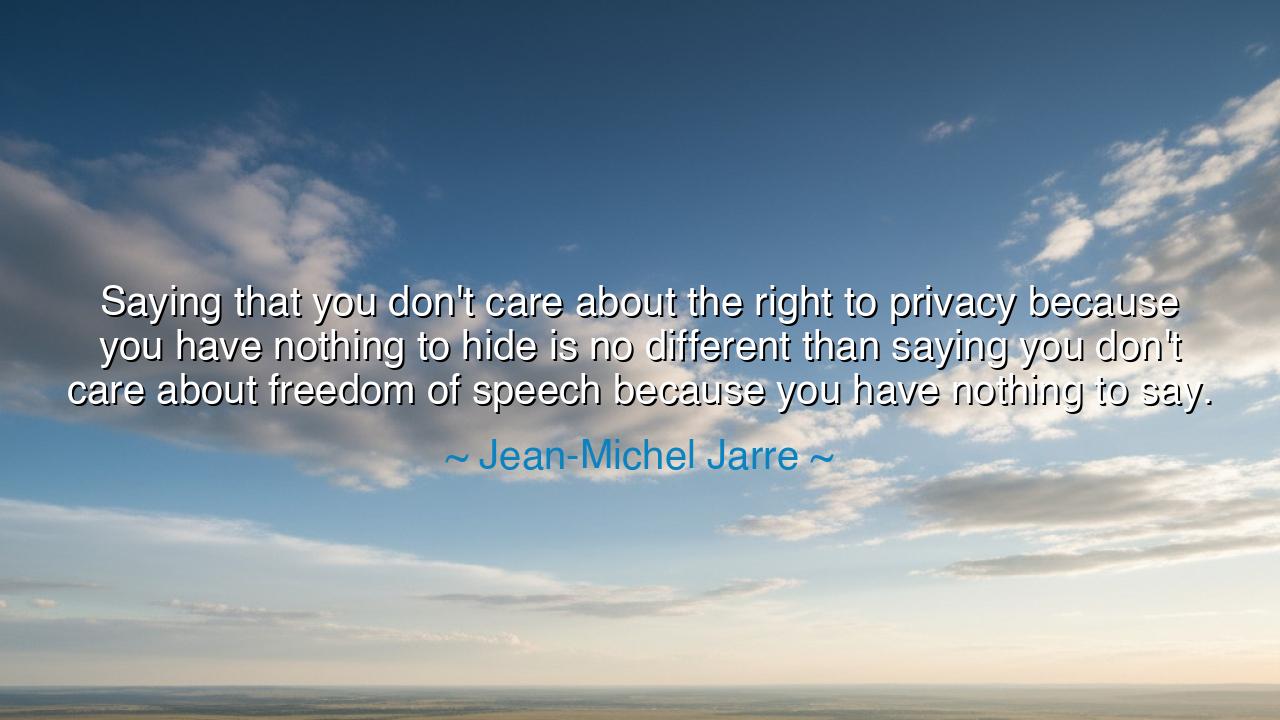
Saying that you don't care about the right to privacy because you
Saying that you don't care about the right to privacy because you have nothing to hide is no different than saying you don't care about freedom of speech because you have nothing to say.






Opening Scene
The soft glow of the evening sun filters through the blinds, casting shadows across the quiet living room. Jack and Jeeny sit together on the couch, the stillness of the moment interrupted only by the occasional turning of a page in the book Jeeny is reading. The world outside feels distant, the usual noise of the city muted by the peace in the room. Jack takes a deep breath, looking up from his book, as if considering something deeper than the words in front of him.
Host: The stillness in the room is almost reflective, as if the conversation unfolding has already begun in their minds. Jeeny’s gaze shifts from the pages to Jack, sensing a shift in the atmosphere. There’s an unspoken question in the air, one that hangs between them like a piece of unfinished business.
Jeeny: (gently, her voice thoughtful) “I was thinking about something Jean-Michel Jarre once said: ‘Saying that you don’t care about the right to privacy because you have nothing to hide is no different than saying you don’t care about freedom of speech because you have nothing to say.’ It’s a powerful thought, don’t you think?”
Jack: (raising an eyebrow, his voice curious) “It’s interesting. At first, it seems like an easy argument to make — if you have nothing to hide, what’s the harm in sacrificing your privacy? But Jarre’s comparison to freedom of speech really flips that idea on its head. It’s not just about what you have to hide; it’s about the principle of having control over your own information, your own voice.”
Jeeny: (nodding, her voice calm but with a note of seriousness) “Exactly. Jarre is pointing out that rights aren’t just about what you actively use or need. It’s about having the freedom to choose, to decide what is private and what is shared. When you give up privacy, you give up a piece of autonomy, of personal freedom.”
Host: The light in the room softens, as if their words are casting deeper shadows across the walls. Jeeny’s voice carries a sense of urgency, while Jack’s expression shifts into one of understanding. The quiet of the moment settles over them, a shared realization growing between them.
Jack: (his voice reflective) “It’s about more than just privacy, isn’t it? It’s about the principle that freedom, whether it’s in speech or personal space, isn’t conditional. If you only care about something when it directly affects you, you’re not really protecting the right itself. You’re letting it slip away, bit by bit.”
Jeeny: (softly, her tone insistent) “Yes. Once you start chipping away at rights because they don’t seem necessary in the moment, you lose sight of their true value. It’s easy to think privacy doesn’t matter if you’re not doing anything ‘wrong,’ but privacy isn’t just about hiding bad things. It’s about maintaining control over your own life, your own identity, and protecting your autonomy.”
Host: The conversation has grown deeper now, as if the words themselves are building something more significant than just an exchange of thoughts. The room feels quieter, the weight of the principle hanging in the air between them. Jack and Jeeny sit together, the sense of urgency around the issue of privacy and freedom growing stronger, yet the conversation remains calm, almost like the quiet before a storm.
Jack: (nodding, his voice more certain) “I think I understand now. It’s not about whether we have something to hide — it’s about the freedom to choose what we share, what we keep private. When we stop protecting those rights, we give up something much bigger than just privacy. We give up the right to decide for ourselves.”
Jeeny: (smiling softly, her voice affirming) “Exactly. The value of freedom lies in the ability to control what’s personal and what’s public, regardless of whether we’re actively using it. By giving that up, even in small ways, we allow the foundation of our freedoms to erode.”
Host: The quiet hum of the room seems to deepen, as though their conversation has reached a point of mutual understanding — one that’s not just intellectual, but rooted in something more personal. The world outside continues on its busy rhythm, but inside, Jack and Jeeny sit in the peaceful realization that the freedom to choose — whether it’s about privacy, speech, or any other right — is something worth protecting. The evening continues, but in this shared understanding, time feels suspended, as if the true value of rights and freedom has been unlocked in their conversation.
Jack: (with a quiet smile, his voice calm) “It’s not about whether I have something to hide. It’s about having the right to keep certain things to myself, to choose what’s shared, what’s mine. And that’s something worth standing up for.”
Jeeny: (smiling, her voice gentle) “Exactly. Protecting privacy, protecting freedom of speech — it’s about safeguarding the right to choose, to decide for ourselves. And when we forget that, we forget the essence of what it means to be free.”
Host: The room feels filled with a new clarity, the weight of their conversation settling into something peaceful and strong. The world outside continues, but inside, there’s a shared sense of resolve, knowing that freedom — whether in privacy, speech, or choice — isn’t just a right; it’s a responsibility to protect, always.






AAdministratorAdministrator
Welcome, honored guests. Please leave a comment, we will respond soon